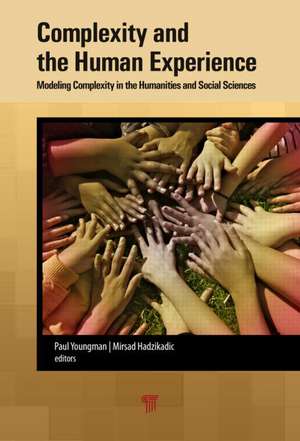Complexity and the Human Experience: Modeling Complexity in the Humanities and Social Sciences
Editat de Paul A. Youngman, Mirsad Hadzikadicen Limba Engleză Hardback – 22 mai 2014
The theory of complexity holds significant promise for better understanding social and human phenomena based on interactions among the participating "agents," whatever they may be: a thought, a person, a conversation, a sentence, or an email. Such systems can exhibit phase transitions, feedback loops, self-organization, and emergent properties. These dynamic systems lend themselves naturally to the kind of analysis made possible by models and simulations developed with complex science tools. This volume offers a tour of quantitative analyses, models, and simulations of humanities and social science phenomena that have been historically the purview of qualitative methods.
Preț: 667.17 lei
Preț vechi: 885.11 lei
-25% Nou
Puncte Express: 1001
Preț estimativ în valută:
127.67€ • 136.52$ • 106.44£
127.67€ • 136.52$ • 106.44£
Comandă specială
Livrare economică 28 martie-11 aprilie
Doresc să fiu notificat când acest titlu va fi disponibil:
Se trimite...
Preluare comenzi: 021 569.72.76
Specificații
ISBN-13: 9789814463263
ISBN-10: 9814463264
Pagini: 304
Ilustrații: 59 black & white illustrations, 23 colour illustrations
Dimensiuni: 152 x 229 x 23 mm
Greutate: 1.25 kg
Ediția:1
Editura: Jenny Stanford Publishing
Colecția Jenny Stanford Publishing
ISBN-10: 9814463264
Pagini: 304
Ilustrații: 59 black & white illustrations, 23 colour illustrations
Dimensiuni: 152 x 229 x 23 mm
Greutate: 1.25 kg
Ediția:1
Editura: Jenny Stanford Publishing
Colecția Jenny Stanford Publishing
Public țintă
Academic and PostgraduateRecenzii
"This volume makes a unique contribution in advancing the case for modeling in the humanities. Contemporary research is increasingly multidisciplinary and enriched by models that cross boundaries whenever dynamically similar phenomena emerge. Until recently, the humanities have stood outside of this development. This work documents pioneering explorations of models, networks, and methodological principles, most significantly, those that consolidate the conceptual, empirical, and practical aspects of inquiry within the humanities."
Prof. Marvin J. Croy, University of North Carolina at Charlotte, USA
"Being able to understand and explain complex ideas in the humanities and social sciences is increasingly important, given the current directions and pace of research and understanding in those fields. The works in this volume show that by applying quantitative methods, such as explanation through use of models, computer simulations, and artificial agents, not only is understanding of complexity assisted, but the visualization of complex phenomena, and the ability to explain and teach complex ideas, is now shown to be within the reach of researchers in fields previously not given to such techniques."
Prof. Charles D. Turnitsa, Columbus State University, USA
Prof. Marvin J. Croy, University of North Carolina at Charlotte, USA
"Being able to understand and explain complex ideas in the humanities and social sciences is increasingly important, given the current directions and pace of research and understanding in those fields. The works in this volume show that by applying quantitative methods, such as explanation through use of models, computer simulations, and artificial agents, not only is understanding of complexity assisted, but the visualization of complex phenomena, and the ability to explain and teach complex ideas, is now shown to be within the reach of researchers in fields previously not given to such techniques."
Prof. Charles D. Turnitsa, Columbus State University, USA
Notă biografică
Paul A. Youngman is associate professor of German studies at Washington and Lee University, USA, and a faculty associate at the Complex Systems Institute, University of North Carolina at Charlotte (UNC Charlotte), USA. He is author of Black Devil and Iron Angel, an analysis of the aesthetic reception of the railway in nineteenth-century Germany, and We Are the Machine, a study of computers, the Internet, and information in contemporary Germany. Prof. Youngman has also authored numerous articles on technology and culture.
Mirsad Hadzikadic has over 30 years of information technology experience combining business and academic environments. He currently serves as the founding director of the Complex Systems Institute at UNC Charlotte. Dr. Hadzikadic’s research interests include data mining, health informatics, complexity theory, brain informatics, and a systems view of policies in financial services, economics, defense, healthcare, and political science.
Mirsad Hadzikadic has over 30 years of information technology experience combining business and academic environments. He currently serves as the founding director of the Complex Systems Institute at UNC Charlotte. Dr. Hadzikadic’s research interests include data mining, health informatics, complexity theory, brain informatics, and a systems view of policies in financial services, economics, defense, healthcare, and political science.
Cuprins
Preface, Introduction: Computer Modeling in Humanities and Social Sciences, Part 1: Complex Adaptive Systems in the Humanities, Part 2: Complex Adaptive Systems in the Social Sciences, Index
Descriere
With the increased adoption of natural science tools in economics, anthropology, and political science, to name only a few social scientific fields highlighted in this volume, quantitative methods in the humanities are becoming more common. This book offers a tour of quantitative analyses, models, and simulations of humanities and social science phenomena that have been historically the purview of qualitative methods. This is the first book of its kind that deals with computer modeling in both the humanities and the social sciences, and thus, simultaneously creates and explores new ground.
